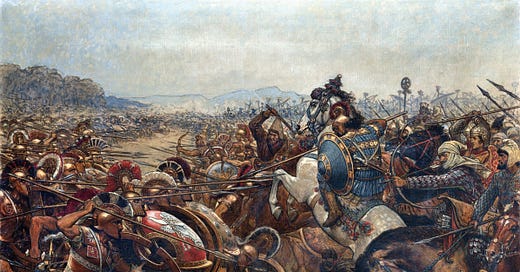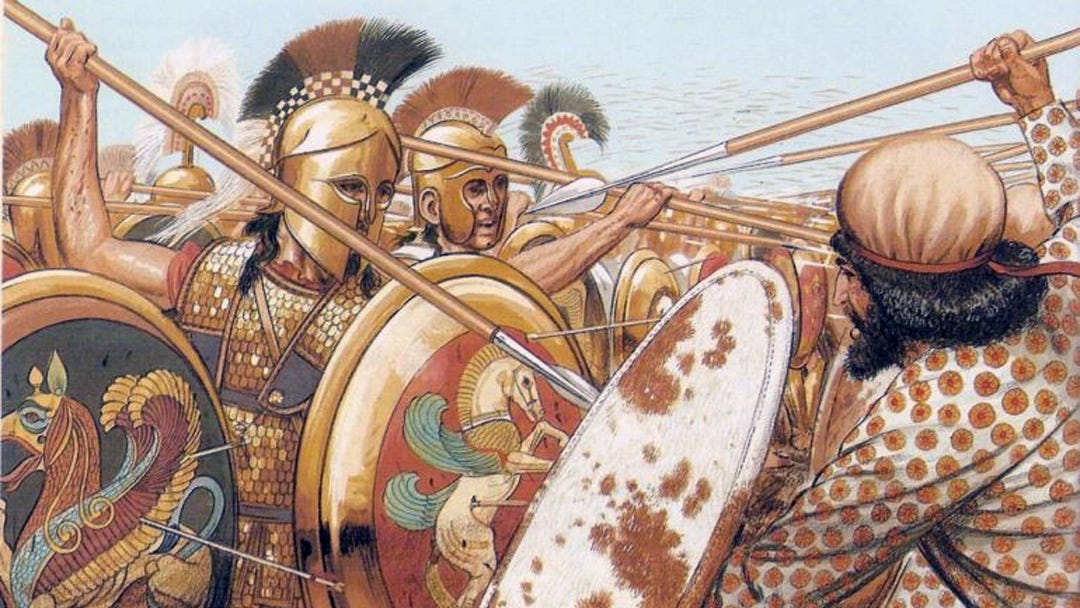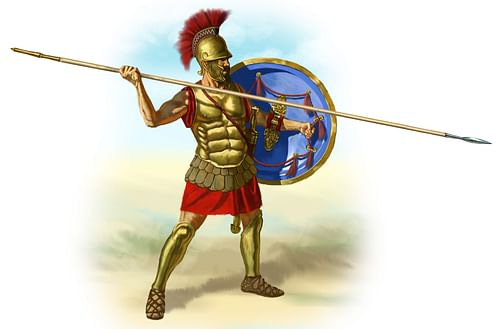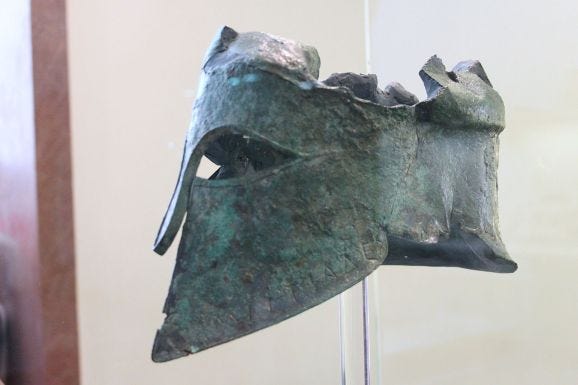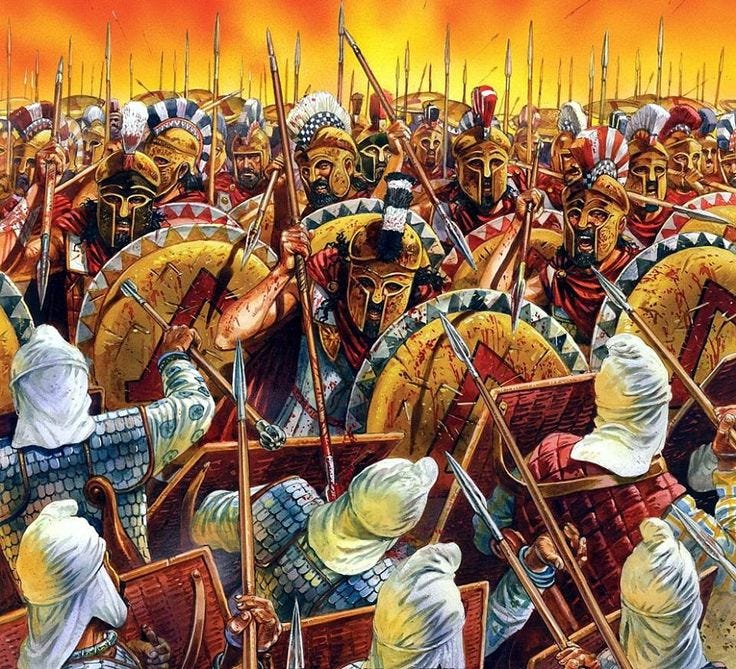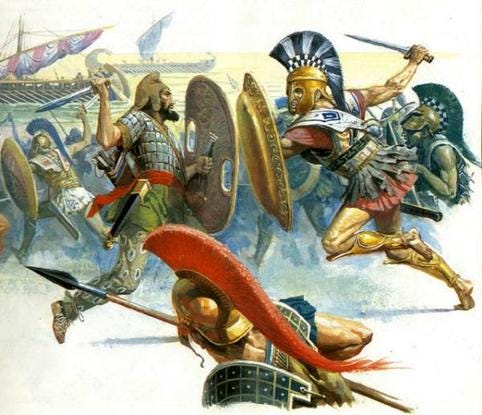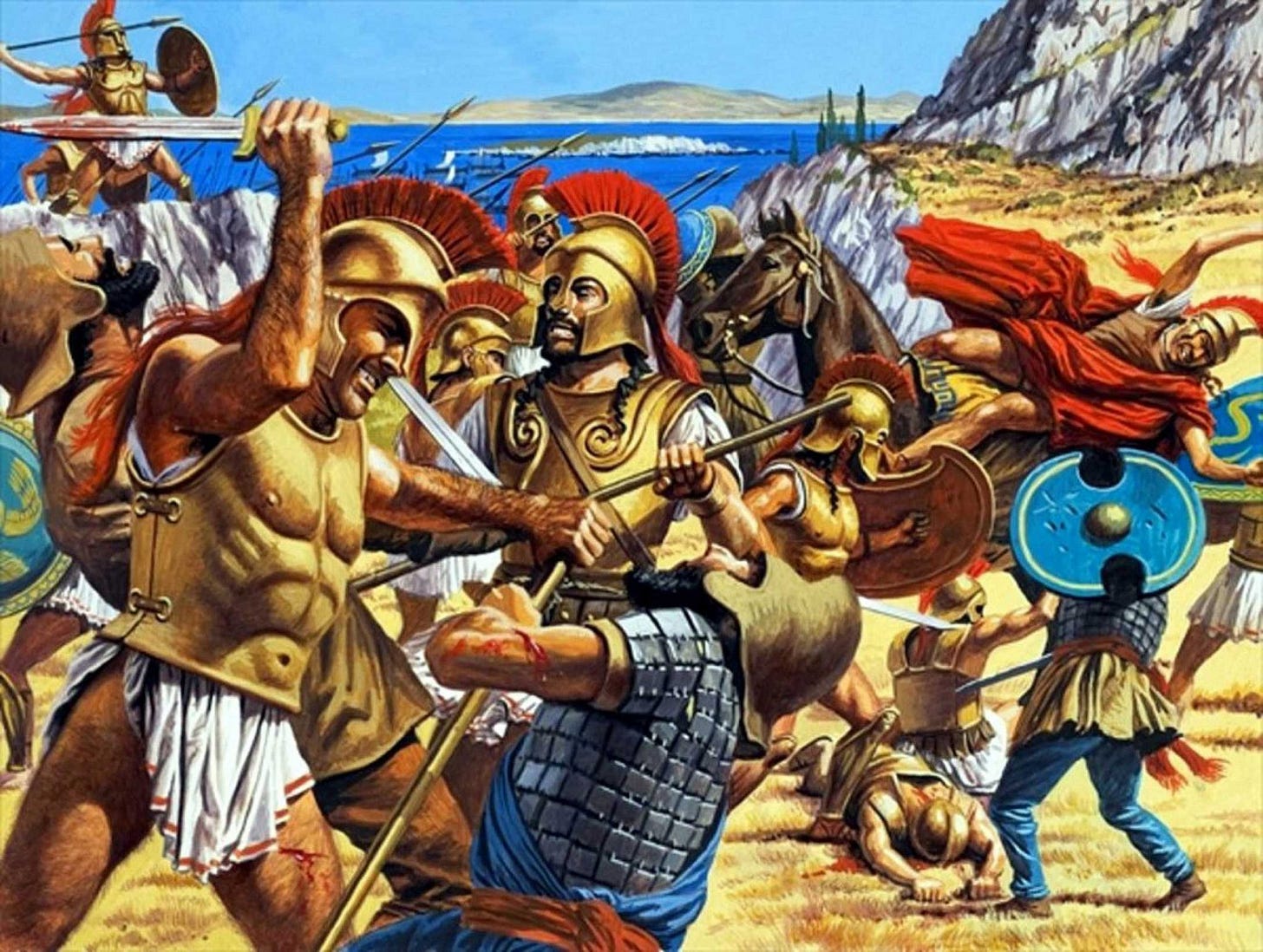Invincibility is a Matter of Perspective
Hello Dear Reader,
In this next publication of Flint and Steal we are delving into one of the greatest and most well known battles of the ancient world. A battle about an underdog defeating one of the greatest empires of the age. A battle that would arguably shape the formation of Western Civilization. So come, dear reader, take a seat around my fire and let’s begin, the Persians land, the Greeks march, and we have much to discuss.
The Stage
Dear reader, if you have been with me so far you know that we must set the stage. It is our duty as students of history to do so. The Battle of Marathon took place between the great Persian Empire and the Athenian Greeks in the ancient year of 490 B.C.
Let us start with the Persians. Under the command of King Darius, the Persian Empire had been flourishing, with more cities and states kneeling to Persian control by the year. However, to say that all these conquests were violent would be misleading as, by many accounts, King Darius was an excellent ruler who treated his subjects fairly and with respect. One cannot continue to grow, as well as manage, the greatest empire the ancient world had ever seen and rule only by the sword.
Now we come to the Greeks. Under the command, of Miltiades who would be voted commander by other Athenian generals, the Greek army consisted of 10,000 Athenians and 1,000 Plataeans. However, it would not be the numbers that won the day as the Persians were said to have 15,000 troops on the field at Marathon. It would also be important to note that the Greeks were fond of their use of heavy infantry as opposed to the Persian light infantry. The Greeks Hoplite armor consisted of bronze helmets, breastplates, shinguards, and foot protectors. This was in stark contrast to the Persians cloth and leather they wore.
Now, the field at Marathon was not necessarily a field but more of a beachhead surrounded by swamp. Miltiades knew this and it was precisely why he chose to give the Persians battle on the beach at Marathon. But Flint, why would anyone charge onto a beach? Well dear reader, a terrific question! To answer this I must delve into the history of our loyal commander. See, Miltiades was a veteran of the Ionian revolt, another war which we we cannot cover in its entirety here today but I will give you the basics.
The Ionian Revolt was a war between the Persians and revolting Greeks that occurred inside captured Greek territory. Before the revolt, Miltiades was a very powerful man who had come from an extremely wealthy family. Marrying Hegesipyle (say that three times fast), the daughter of a Thracian prince, he soon had political power to go along with his wealth. However, this was not to last. When the Persians came and subjugated parts of Thrace, King Darius forced him to become a vassal of the Empire. Needless to say, Miltiades was not happy with this. So, he and other free Greeks revolted. Whether he was more upset at having his freedom or his power taken away, will be left for you to decide. To the surprise of the Greeks and Persians, the revolting soldiers were able to successfully recapture the isles of Lemnos and Imbros, and then subsequently gave the isles to Athens to rule. Now, the point I am making here is that Miltiades knew the Persians and their battle tactics especially as it came to their strengths and weaknesses.
Now, we come back to the beach. The reason Miltiades decided to fight on a beach is because he had seen the power of Persian cavalry firsthand and knew that it was the backbone if their army. If he could fight on fine beach sand, he knew the cavalry would be ineffective and nearly unusable. The Persian cavalry could also not outflank the Greeks as they were surrounded by swamp (the Persian cavalry had not yet landed but he did not know this until he was engaged). He also knew that their infantry, in their vast numbers, would overwhelm a fighting force on an open plain but could be kept manageable if certain conditions aligned (see Leonidas and The Hot Gates). He knew that the Persian army would need to keep themselves on the beach as they could also not maneuver through the swamps, at least not in large numbers. The beach it was and a glorious charge it would be. He also hoped to catch the Persians by surprise as they were still in the process of landing and had not yet pushed inland. There were ships further out to sea with more Persians that had not yet disembarked and he could not waste the opportunity to attack the landed 15,000 soldiers, all light infantry.
Slaves to No Lord
Upon arriving at Marathon, Miltiades and the Greeks were happy to see that the conditions of battle favored them immensely. Wasting no time, and taking the Persians by complete surprise, the first stage of the battle was for the Greeks to charge the Persians. To their horror, upon seeing thousands Greeks descending down upon them, the Persians hastily formed a line to meet the Greeks as best they could. There have been many sources remarking how the Persians thought the Greeks mad for charging their army, especially with them so few in number.
To both sides surprise, the Persians were able to route the initial attack. So, Miltiades decided a different tactic would need to be used. Instead of falling back, the Greeks strengthened the grip on their spears, tightened the buckles on their sandals, clenched their teeth and, with a final exertion of Greek bravery, rallied with resolve. Still used today, the Greeks caught the Persians in a Double Envelopment. For those that are unfamiliar with ancient military strategy, a double envelopment is where one force hits another forces flanks simultaneously. It can also be described as a pincer movement or an encirclement. The heavily armored Greeks, once their center had been hotly engaged for a second time, wrapped, and catching the Persians in both of their flanks, crushed them. The lightly armored Persians, dilapidated, confused, and without reinforcement, bore the full weight of a second Athenian attack. They stood no chance.
The Persians collapsed and having to retreat into the sea, were largely destroyed. Some did manage to make it back to their skiffs and ships although more tried to retreat into the swamps that flanked the battlefield. This would also prove futile as many of the Persian soldiers were either hunted or drowned in the murky water. It is said that, in the Battle of Marathon, over 6,400 Persian soldiers died with only 192 Greek men succumbing to death. For those of you wondering, that is kill to death ratio of 33.3 from the Athenian point of view.
Now, dear reader, I am sure you are wondering why no other Greeks came to support the Athenians, besides the Plataeans. Where were the legendary Spartans? Well, they were contacted by the Athenians asking for support before the battle. Initially, the Spartans agreed to help, however, they were celebrating a religious festival and would not engage the Persians until after the festival had concluded (the Athenians and Spartans were also not of the best of terms, see next publication for more). As we know, the Athenians decided not to wait to strike as waiting would mean giving the Persians ample time for more infantry and cavalry to land. Immediately before the battle, however, another runner was dispatched to Sparta informing the Spartans that the Athenians would be presently and hotly engaged. The Spartans then decided they could wait no longer and covered a distance of 150 miles (240 kilometers) in two to three days. At least that is what was reported. They arrived seeing the battle was already won but this was important as it proved Greek cities and states could roughly rely on each other to defend their shared homeland.
Before we move on, I would like to touch on one more piece of information. This being that we still remember the Battle of Marathon by reenacting a dash by a brave Athenian soldier. After the Greeks defeated the Persians, a runner by the name of Philippides, was sent about 26 miles (40 km) from the battlefield to Athens announcing the Greek victory over their enemy. He is said to have subsequently died from exhaustion but that does not stop us from having our annual marathons in whatever city you so choose to live in.
My Lord, Remember the Athenians
In the end, the Persians were fundamentally routed and were forced to lick their wounds. However, this would not be the last the last time the Greeks and Persians would be at each others throats.
Immediately following the battle, King Darius would regroup and sail his ships to Athens, thinking it undefended. However, under a forced march, the Athenians made it back in time to defend Athens. After seeing the city was defended, King Darius would not give battle and retreated back to Asia. He would raise a huge army to crush all of Greece but would be forced to delay his Greek expansion due to a revolt in Egypt in 486 BC. Unfortunately, Darius would never see his Greek dreams come to fruition as he would die and his tolerance with him. When the Persians would come back to Greece under Darius’ son, Xerxes, during the Second Invasion of Greece in 480 BC, they would find initial success and burn Athens to the ground. However, after the decisive Greek victory at the Battle of Plataea, the Persians would abandon their efforts in Greece and never again return to Europe.
Where Does This Leave Us?
Well, dear reader, this is an excellent question. Some may say that the Battle of Marathon may be one of the most important battles in the history of Western Civilization. Why is this? Well that is an excellent question. Let’s start with what we know.
The Greeks are most certainly one of the most important ancient societies. They made great contributions to philosophy, medicine, astronomy, and mathematics. They were also rather large proponents of freedom and democracy. There are a number of battles that show this, such as the Battle of Thermopylae as showcased in the movie 300. Now that might be a Hollywood retelling but we can take a number of inferences from not only the Battle of Thermopylae but also the Battle of Marathon as well. The largest inference is that Greece was the forefront or the frontline between Europe and the Middle East. The Greeks, whether Athenian, Spartan, or other, would stop Persian influence and early Middle Eastern culture from coming into Europe. This would also be the first step towards forming a national identity, as Greek cities and states decided it would be better to unify to face common threats together.
However, some would argue that the Greeks would still have made their contributions if they were part of the Persian Empire. The Persians were certainly also one of the great empires and civilizations in antiquity. Why were they so great? Well, again, they took a rather modern view to dealing with other cultures. The Persian Empire generally ruled with liberal tolerance, which was in stark contrast to other empires such as the Assyrian Empire. The Persians generally allowed you to practice your traditions, customs, religions, and languages. The only major requirements were for you to pay your tax to the Persian Empire and recognize their rule. Life under the Persians, for a conquered peoples, was generally unchanged. Unfortunately, for the Greeks, they would most likely have taken credit for Greek inventions and discoveries. However, some would argue that this is a small price to pay for prosperity and peace. Whether or not Persian control would have changed the contributions the Greeks made will forever remain unknown.
Well dear reader, it seems the Persians are beginning to sail away and the Greeks are starting to celebrate. Join me next time as we delving into the enduring rivalry between the Athenian and the Spartan.

